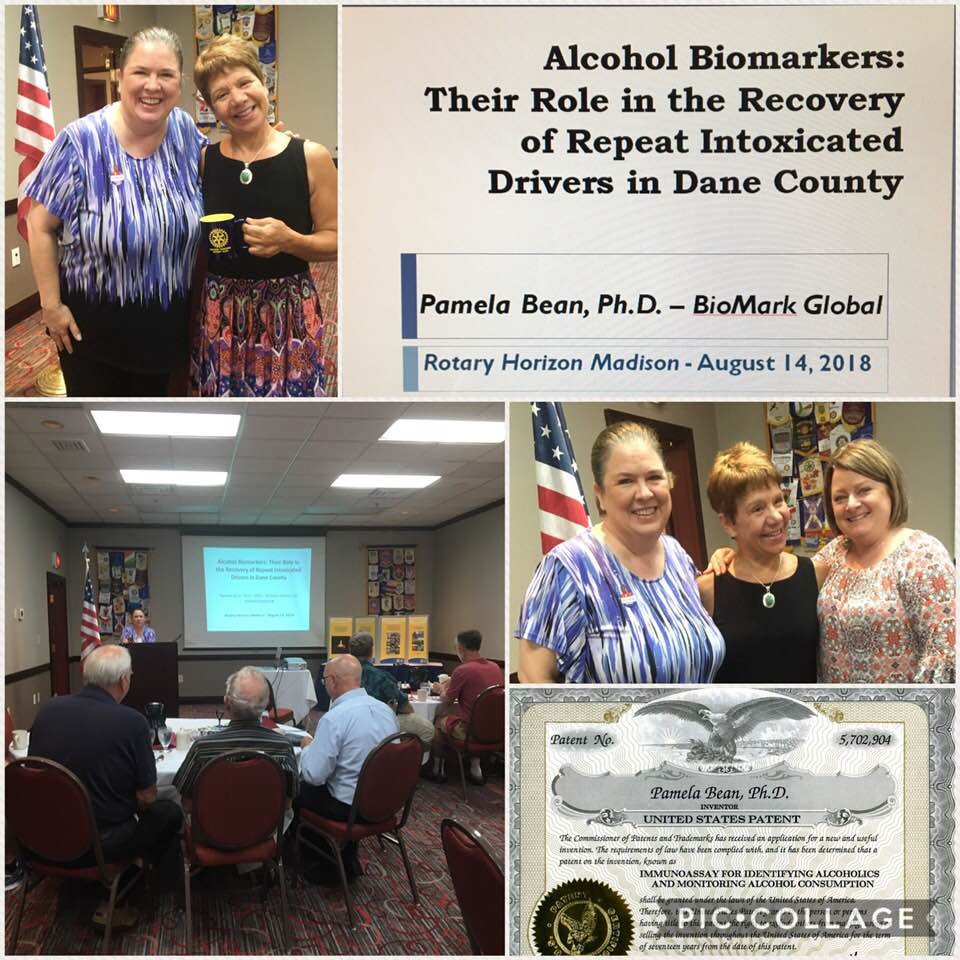Alcohol Biomarkers - (indicators of heavy drinking)
Liver enzymes become elevated for a lot of reasons, not just heavy alcohol consumption. Alcohol biomarkers are a more accurate way to diagnose heavy drinking. In the 90s, the life insurance industry used a million of these tests per year to identify heavy drinkers purchasing a life insurance policy from them. Heavy drinkers are those who drink an average of 4 drinks daily for men and 3 drinks daily for females.
The two biomarkers being used on repeat intoxicated drivers in Dane Co. are: 1) Ethyl Glucuronide (EtG) which is found in finger nails and suggest the occurrence of at least 7 binges (5 or more drinks on one occasion) in the last 3 months, and 2) Phosphatidyl Ethanol (PEth) which is found in red blood cells and indicates heavy drinking for the last 2 or 3 weeks before testing. EtG is a long term and Peth is a short term indicator of abusive drinking.
DUI in Wisconsin - stats
When Dr. Bean came to Madison, she couldn't believe the newspaper articles on repeat offender drunk drivers. When you're talking about people with 7, 8, 10 or 11…OWI in their life times you know there is a problem.
When Dr. Bean came to Madison, she couldn't believe the newspaper articles on repeat offender drunk drivers. When you're talking about people with 7, 8, 10 or 11…OWI in their life times you know there is a problem.
She knew they used these molecules to monitor drunk drivers in Europe so she decided to replicate the European program in Wisconsin Counties. She talked to different people and finally in 2005 she talked to the Advisory Committee for Intoxicated Drivers Programs in the state of Wisconsin which sent letters to all 72 counties informing them about this pilot program. As a result, Waukesha was the first county to adopt biomarker testing in 2006; their goal was to use them as tools to improve relapse detection and treatment of repeat intoxicated drivers.
Dane Co. started using them in 2010 supported with monies from the county and a federal block grant. In 2017, Dane transferred the testing costs to the drivers; the lab charges $75-100 per test.

In Dane County, Journey Mental Health does the testing for all repeat intoxicated drivers with 3 OWIs or more. Drivers are tested three times in a 12-month period. The first test is at the time of their (mandatory) assessment interview to establish a baseline.
The second and third times are at months 5 and 11 post enrollment. If the driver tests positive in any of these timelines, then the assessor will contact the driver to do a brief intervention and request a repeat test within a month; the assessor also contacts the treatment provider to recommend more treatment. Drivers who test positive after a year have to enroll in another full year of biomarker testing and monitoring.
The Central Assessment Unit at Journey serves more than 300 repeat offenders each year, 70-80% complete the program. Of those who complete, 30% suffer a relapse to heavy drinking during monitoring. 70% respond well to BI and stop relapse.
The re-arrest rate of these folks in five years is 10%. If you compare those who went through the program and those who left prematurely, those who left prematurely are three times more likely to be re-arrested within five years of enrolling in the program. It costs the county $100/day to offset the costs of one day of jail for each OWI offender. For comparison, drivers pay less than $500/year to go through this program.
The Central Assessment Unit at Journey serves more than 300 repeat offenders each year, 70-80% complete the program. Of those who complete, 30% suffer a relapse to heavy drinking during monitoring. 70% respond well to BI and stop relapse.
The re-arrest rate of these folks in five years is 10%. If you compare those who went through the program and those who left prematurely, those who left prematurely are three times more likely to be re-arrested within five years of enrolling in the program. It costs the county $100/day to offset the costs of one day of jail for each OWI offender. For comparison, drivers pay less than $500/year to go through this program.
Dr. Bean was born in Santiago, Chile and came to the US 35 years ago invited by the University of Utah to work on the replication of the Influenza virus. There she met her husband James and moved to California where she went to work at the California Institute of Technology and then enrolled in a Ph.D. program at the University of Southern California. After getting her Ph.D. in Experimental Pathology she moved to private industry to start her career in alcohol abuse diagnosis.
While working at Specialty Labs. she authored a patent with a research group in Northwestern University. She moved to Madison in 1997 where she has continued her work on alcohol biomarkers at BioMark Global, LLC.
To find out more about these programs go to: www.biomark.org
